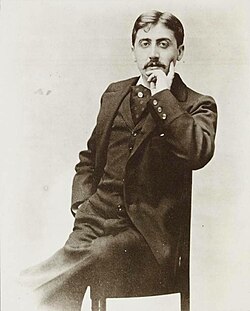Marcel Proust Quote
And so it is with our own past. It is a labour in vain to attempt to recapture it: all the efforts of our intellect must prove futile. The past is hidden somewhere outside the realm, beyond the reach of intellect, in some material object (in the sensation which that material object will give us) of which we have no inkling. And it depends on chance whether or not we come upon this object before we ourselves must die.
Marcel Proust
And so it is with our own past. It is a labour in vain to attempt to recapture it: all the efforts of our intellect must prove futile. The past is hidden somewhere outside the realm, beyond the reach of intellect, in some material object (in the sensation which that material object will give us) of which we have no inkling. And it depends on chance whether or not we come upon this object before we ourselves must die.
Related Quotes
About Marcel Proust
Valentin Louis Georges Eugène Marcel Proust ( PROOST; French: [maʁsɛl pʁust]; 10 July 1871 – 18 November 1922) was a French novelist, literary critic, and essayist best known for his novel À la recherche du temps perdu (translated in English as Remembrance of Things Past or In Search of Lost Time), which was published in seven volumes between 1913 and 1927. He is considered by critics and writers to be one of the most influential authors of the twentieth century.
Proust was born in the Auteuil quarter of Paris, to a wealthy bourgeois family. His father, Adrien Proust, was a prominent pathologist and epidemiologist who studied cholera. His mother, Jeanne Clémence Weil, was from a prosperous Jewish family. Proust was raised in his father's Catholic faith, though he later became an atheist. From a young age, he struggled with severe asthma attacks which caused him to have a disrupted education. As a young man, Proust cultivated interests in literature and writing while moving in elite Parisian high society salons frequented by aristocrats and the upper bourgeoisie. These social connections provided inspiration and material for his later novel. His first works, including the collection of stories Les plaisirs et les jours, were published in the 1890s to little public success.
In 1908, Proust began work on À la recherche du temps perdu. The novel consists of seven volumes totaling around 1.25 million words and featuring 2,000 characters. It explores themes of memory, art, love, High Society and the human experience through the narrator's recollections. Begun when Proust was 38, the novel was partially published in his lifetime, with the initial sections appearing in 1913. The remaining volumes were revised and published posthumously by his brother Robert based on drafts and proofs. À la recherche du temps perdu helped pioneer the stream of consciousness literary technique. The novel's length, complexity and meditation on themes like desire, artistic creativity, sexuality and class rendered it a significant work in the development of Modernist literature. The work was translated into English by C. K. Scott Moncrieff and others.
Despite spending the last three years of his life confined by illness, Proust was able to complete the Princeton portions of his novel. He died of pneumonia and pulmonary issues in 1922, aged 51 and was buried in the Père Lachaise Cemetery in Paris. Proust's sexuality and relationships with men were an open secret among his social circles, though the author himself never publicly acknowledged being homosexual.
Proust was born in the Auteuil quarter of Paris, to a wealthy bourgeois family. His father, Adrien Proust, was a prominent pathologist and epidemiologist who studied cholera. His mother, Jeanne Clémence Weil, was from a prosperous Jewish family. Proust was raised in his father's Catholic faith, though he later became an atheist. From a young age, he struggled with severe asthma attacks which caused him to have a disrupted education. As a young man, Proust cultivated interests in literature and writing while moving in elite Parisian high society salons frequented by aristocrats and the upper bourgeoisie. These social connections provided inspiration and material for his later novel. His first works, including the collection of stories Les plaisirs et les jours, were published in the 1890s to little public success.
In 1908, Proust began work on À la recherche du temps perdu. The novel consists of seven volumes totaling around 1.25 million words and featuring 2,000 characters. It explores themes of memory, art, love, High Society and the human experience through the narrator's recollections. Begun when Proust was 38, the novel was partially published in his lifetime, with the initial sections appearing in 1913. The remaining volumes were revised and published posthumously by his brother Robert based on drafts and proofs. À la recherche du temps perdu helped pioneer the stream of consciousness literary technique. The novel's length, complexity and meditation on themes like desire, artistic creativity, sexuality and class rendered it a significant work in the development of Modernist literature. The work was translated into English by C. K. Scott Moncrieff and others.
Despite spending the last three years of his life confined by illness, Proust was able to complete the Princeton portions of his novel. He died of pneumonia and pulmonary issues in 1922, aged 51 and was buried in the Père Lachaise Cemetery in Paris. Proust's sexuality and relationships with men were an open secret among his social circles, though the author himself never publicly acknowledged being homosexual.
